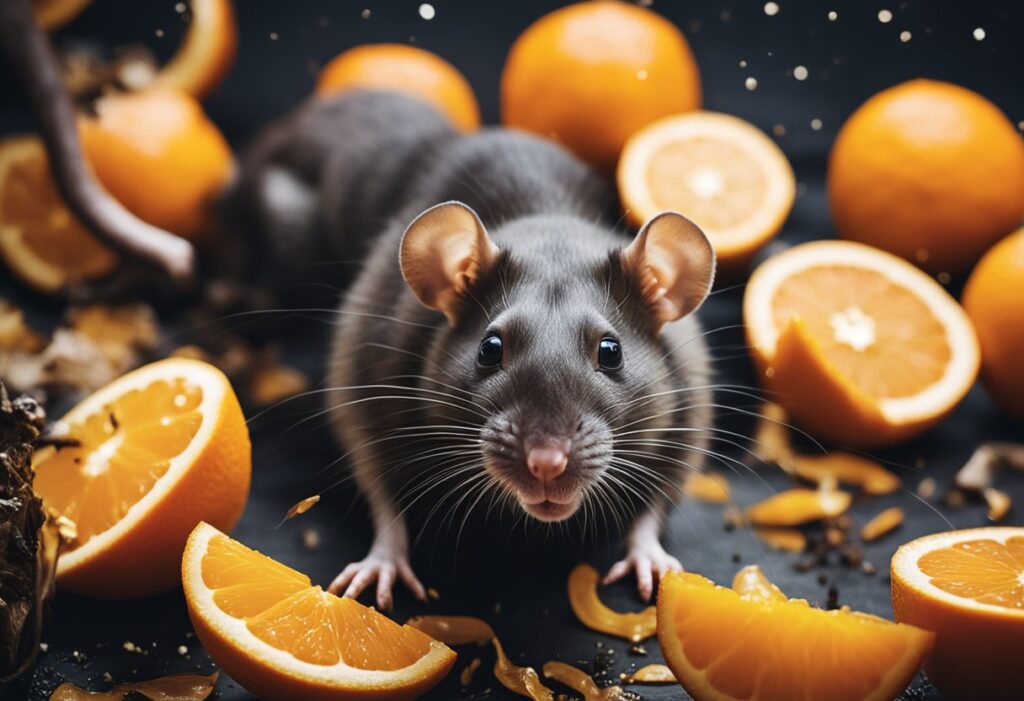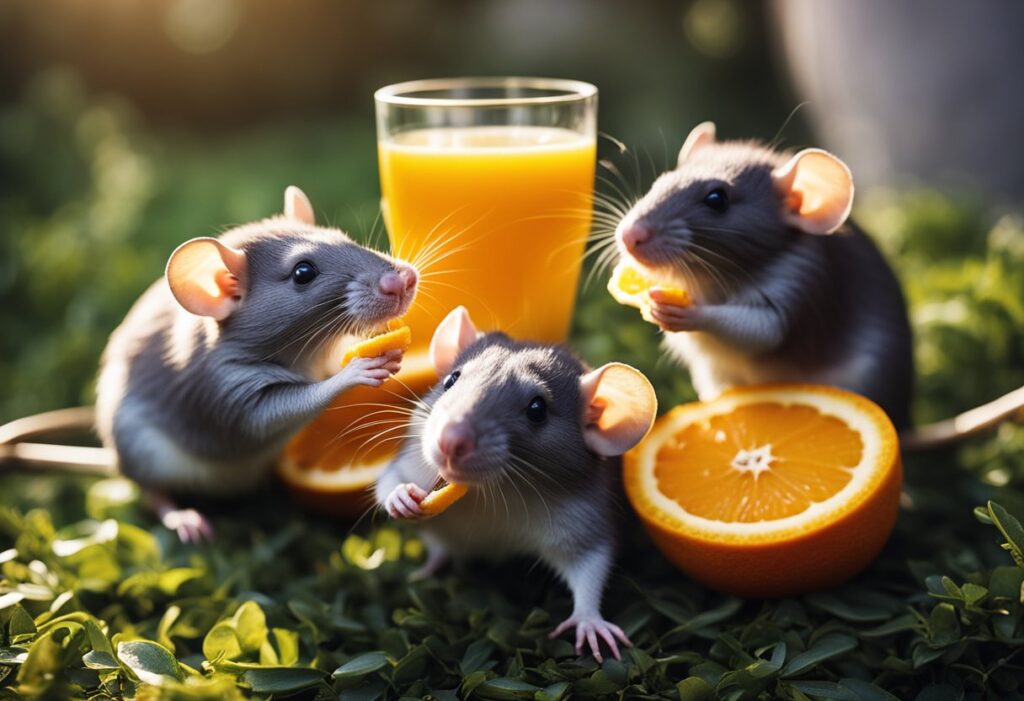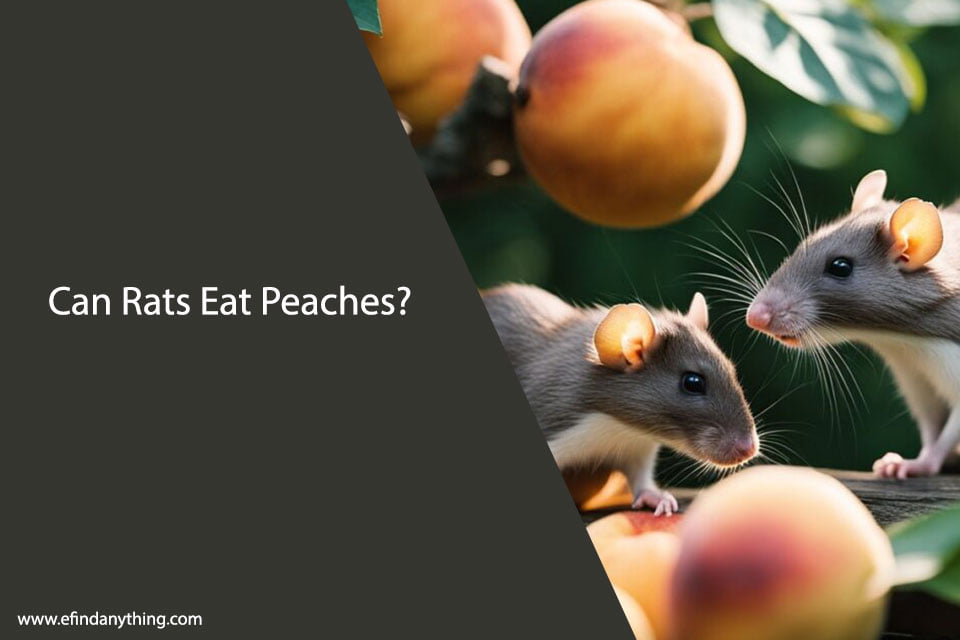Yes, rats can eat oranges in moderation. Oranges are a good source of vitamin C and can be a healthy treat for pet rats. However, it’s essential to remove any seeds and offer them in small, bite-sized pieces to prevent choking hazards.
Rats are known to be voracious eaters, and they can consume almost anything that comes their way. However, when it comes to feeding them fruits, it’s essential to know which ones are safe for them and which ones are not. One such fruit that often raises questions is oranges. Can rats eat oranges? Let’s find out.

Oranges are a rich source of vitamin C, fiber, and other essential nutrients that are beneficial for humans. However, when it comes to rats, the situation is a bit different. Rats have a unique digestive system, and not all fruits and vegetables are suitable for them. While some fruits can be nutritious for rats, others can be harmful and cause digestive problems. So, can rats safely consume oranges? We’ll explore this topic in detail in the following paragraphs.
Can Rats Eat Oranges

As omnivores, rats can eat a variety of foods, including fruits. Oranges, in particular, are a common fruit that people wonder if rats can eat. The answer is yes, rats can eat oranges.
Oranges are rich in Vitamin C, which is essential for rats’ health. It helps to boost their immune system and prevent diseases. However, it is important to note that oranges should be given to rats in moderation.
Rats have a sweet tooth, and oranges are high in sugar. Too much sugar can lead to health problems such as obesity and dental issues. Therefore, it is recommended to give rats small pieces of oranges as a treat, rather than a regular part of their diet.
It is also important to wash the oranges thoroughly before giving them to rats. Pesticides and other chemicals used in farming can be harmful to rats’ health.
In summary, rats can eat oranges, and it can be a healthy addition to their diet if given in moderation. Remember to wash the oranges before giving them to rats and to limit their intake due to the high sugar content.
Can Rats Eat Orange Seeds?

Orange seeds are not toxic to rats and can be consumed by them. However, it is important to note that the seeds contain a small amount of cyanide, which can be harmful if consumed in large quantities. Therefore, it is recommended to limit the amount of seeds that rats consume.
In addition, orange seeds are hard and difficult to digest, which can cause digestive issues in rats. It is best to remove the seeds from the orange before feeding it to your pet rat.
When feeding oranges to rats, it is important to remember that they should only be given as a treat and not as a main part of their diet. Rats require a balanced diet that includes a variety of fruits, vegetables, grains, and protein sources.
Overall, while rats can eat orange seeds, it is important to exercise caution and moderation when feeding them to your pet.
Can Rats Eat Orange Peel

As we know, oranges are a great source of vitamin C, fiber, and other nutrients. But can rats eat orange peel? The answer is yes, rats can eat orange peel, but in moderation.
Orange peel contains essential oils that can be beneficial to rats’ health. However, it also contains limonene, a compound that can be toxic in large amounts. Therefore, it is essential to feed rats orange peel in moderation.
It is also important to note that orange peel can be difficult for rats to digest, and it may cause digestive issues such as bloating or diarrhea if fed in large quantities. Therefore, it is recommended to feed rats small amounts of orange peel as a treat rather than a regular part of their diet.
In summary, rats can eat orange peel, but it should be given in moderation. As with any new food, it is important to introduce it slowly and monitor your rat’s reaction to ensure they do not have any adverse effects.
Can Rats Have Orange Juice

As we know, oranges are a good source of vitamin C, fiber, and other nutrients. But, can rats have orange juice?
The answer is yes, rats can have orange juice. However, it should be given in moderation and not as a substitute for water. Orange juice is high in sugar and can cause health problems if given in excess.
It is important to note that not all rats may like the taste of orange juice. Some may prefer other fruits or vegetables. It is recommended to introduce new foods to rats gradually and in small amounts to avoid digestive problems.
In summary, rats can have orange juice, but it should be given in moderation as a treat and not as a substitute for water. As always, it is important to consult with a veterinarian or animal nutritionist for specific dietary recommendations for your pet rat.
Can Male Rats Eat Oranges
As omnivores, rats can eat a variety of fruits including oranges. Male rats, like their female counterparts, can eat oranges as a part of a balanced diet. Oranges are a good source of vitamin C, fiber, and other important nutrients that can benefit male rats.
However, it is important to note that oranges should not be the main source of nutrition for male rats. They should be given in moderation as a treat or supplement to their regular diet. Overfeeding oranges to male rats can lead to health problems such as diarrhea and obesity.
When feeding oranges to male rats, it is important to remove the seeds and peel. The seeds contain small amounts of cyanide which can be harmful to rats if ingested in large quantities. The peel, on the other hand, is difficult for rats to digest and can cause digestive problems.
In conclusion, male rats can eat oranges as a part of a balanced diet. However, they should be given in moderation and without the seeds and peel. As with any new food, it is important to introduce oranges slowly and monitor your male rat for any adverse reactions.
Can Fancy Rats Eat Oranges
As rat owners, we often wonder if our furry friends can eat the same foods that we do. Oranges are a common fruit that many of us enjoy, but can our fancy rats eat them too?
The answer is yes, fancy rats can eat oranges. Oranges are a great source of vitamin C, which is essential for maintaining a healthy immune system. However, it is important to note that oranges should only be given to rats in moderation.
Oranges are high in sugar, and too much sugar can lead to obesity and other health issues in rats. Additionally, the acidic nature of oranges can cause digestive problems if given in excess.
When feeding oranges to your fancy rat, it is important to remove the seeds and peel. The seeds can be a choking hazard, and the peel can be difficult for rats to digest. It is also recommended to cut the orange into small pieces to prevent choking.
In summary, fancy rats can eat oranges, but it should be given in moderation and with caution. As with any new food, it is important to introduce oranges slowly and monitor your rat’s reaction to ensure they do not have any adverse effects.
Nutritional Profile of Oranges
Oranges are a citrus fruit that is known for its sweet and tangy taste. They are a good source of several essential nutrients that are required by the body for optimal health. In this section, we will discuss the nutritional profile of oranges and the different nutrients they contain.
Vitamin C Content
Oranges are one of the best sources of vitamin C, an essential nutrient that helps the body fight off infections and diseases. One medium-sized orange contains about 70 milligrams of vitamin C, which is more than the daily recommended intake for adults. Vitamin C is also a powerful antioxidant that helps protect the body against the harmful effects of free radicals.
Sugar Levels
Oranges are a naturally sweet fruit that contains natural sugars like fructose and glucose. One medium-sized orange contains about 12 grams of sugar, which is relatively low compared to other fruits like bananas and grapes. However, people with diabetes or those watching their sugar intake should consume oranges in moderation.
Fiber and Pulp
Oranges are a good source of dietary fiber, which is essential for maintaining a healthy digestive system. One medium-sized orange contains about 3 grams of fiber, which is about 12% of the daily recommended intake for adults. Oranges also contain pulp, which is the fibrous material that is found inside the fruit. The pulp is rich in antioxidants and can help lower cholesterol levels in the body.
Overall, oranges are a nutritious and delicious fruit that can be enjoyed as a snack or incorporated into a variety of dishes. They are a good source of several essential nutrients, including vitamin C, fiber, and antioxidants, that are required by the body for optimal health.
Health Benefits for Rats
Rats can benefit from eating oranges in various ways. In this section, we will discuss the health benefits of oranges for rats, including immune system support and digestive health.
Immune System Support
Oranges are rich in vitamin C, which is known to boost the immune system. Rats, just like humans, require vitamin C to maintain their health. A deficiency in vitamin C can lead to scurvy, a condition that can cause lethargy, weight loss, and even death in rats.
By feeding rats oranges, we can provide them with the necessary vitamin C to support their immune system. This can help rats fight off infections and diseases, leading to a healthier and happier life.
Digestive Health
Oranges are also a good source of fiber, which is essential for maintaining digestive health in rats. Fiber helps to promote bowel movements and prevent constipation, which can be a common issue in pet rats.
In addition, the natural sugars found in oranges can provide rats with a quick burst of energy, which can be beneficial for their overall health and well-being.
Overall, feeding rats oranges in moderation can provide them with a range of health benefits, including immune system support and digestive health. However, it is important to remember that oranges should not be the sole source of nutrition for rats, and a balanced diet is essential for their overall health and well-being.
Potential Risks
When considering feeding rats oranges, it is important to be aware of potential risks associated with this fruit. In this section, we will discuss two main concerns: citrus acidity and sugar content.
Citrus Acidity
Oranges are a citrus fruit, which means they have a high level of acidity. While this acidity is safe for humans, it can cause digestive issues for rats. Rats have a more sensitive digestive system than humans, and consuming too much citrus can lead to upset stomachs, diarrhea, and even vomiting.
It is important to note that some rats may be more sensitive to citrus acidity than others. If you decide to feed your rat oranges, start with a small amount and monitor their reaction closely. If your rat shows any signs of discomfort, stop feeding them oranges immediately.
Sugar Content Concerns
Oranges are also high in sugar, which can be a concern for rats. Rats are prone to obesity and diabetes, and a diet high in sugar can contribute to these health issues. While a small amount of orange as a treat is unlikely to cause harm, it is important to limit your rat’s intake of sugary foods.
If you do decide to feed your rat oranges, make sure to only offer them as an occasional treat. It is also important to balance your rat’s diet with other healthy foods to ensure they are getting all of the nutrients they need.
In conclusion, while oranges can be a tasty treat for rats, it is important to be aware of potential risks associated with this fruit. By monitoring your rat’s reaction and limiting their intake, you can safely offer oranges as an occasional treat.
Feeding Guidelines
When it comes to feeding rats oranges, it is important to keep in mind a few guidelines to ensure their health and well-being. Here are some tips to consider:
Portion Control
Rats have a small stomach and can only eat a limited amount of food at a time. Therefore, it is important to give them oranges in small portions. One or two small pieces of orange per day is enough for an adult rat. Overfeeding can lead to obesity and other health problems, so it is important to exercise portion control.
Frequency of Feeding
While rats can eat oranges, they should not be given oranges every day. A diet that is too high in sugar can lead to health problems such as diabetes. It is recommended to limit the frequency of feeding oranges to once or twice a week. This will provide your rat with a variety of nutrients without overloading them with sugar.
In conclusion, feeding rats oranges can be a healthy addition to their diet when done in moderation. By following these guidelines, you can ensure that your rat receives the necessary nutrients without causing any harm to their health.
Alternative Fruits for Rats
When it comes to feeding our pet rats, it’s important to provide them with a balanced diet that includes a variety of foods. While rats can eat oranges in moderation, it’s always good to have some alternative fruit options on hand.
Safe Fruit Options
Here are some fruits that are safe and healthy for rats to eat:
- Apples: Rats love apples, and they’re a great source of fiber and vitamin C. Just make sure to remove the seeds and core before feeding them to your rat.
- Bananas: Bananas are another favorite of rats, and they’re a good source of potassium. Be sure to only give your rat small pieces, as bananas are high in sugar.
- Blueberries: Blueberries are packed with antioxidants and other nutrients that are beneficial to rats. Just be sure to give them in moderation, as they are high in sugar.
- Grapes: Grapes are a good source of fiber and vitamins, but they should be given in moderation due to their high sugar content.
Fruits to Avoid
While there are many fruits that rats can eat safely, there are also some that should be avoided:
- Citrus fruits: While rats can eat oranges, other citrus fruits like lemons and grapefruits should be avoided. These fruits are too acidic and can cause digestive issues for rats.
- Avocado: Avocado contains persin, a toxin that can be harmful to rats. It’s best to avoid feeding them this fruit altogether.
- Cherry pits: Cherries are safe for rats to eat, but the pits should be removed. Cherry pits contain cyanide, which is toxic to rats.
In conclusion, incorporating a variety of fruit options into your rat’s diet can help keep them healthy and happy. Just be sure to choose fruits that are safe and healthy for them to eat, and always give them in moderation.
Frequently Asked Questions
Are oranges safe for rat consumption?
Yes, oranges are generally safe for rats to eat. They are a good source of vitamin C and other nutrients that can be beneficial to rats’ health. However, it is important to feed oranges in moderation and as part of a balanced diet.
Is there any risk in feeding orange seeds to rats?
Orange seeds are not toxic to rats, but they can pose a choking hazard. Therefore, it is best to remove the seeds before feeding oranges to your rats.
Can both male and female rats eat oranges without health issues?
Yes, both male and female rats can eat oranges without any health issues. However, if your rat has a pre-existing medical condition, it is best to consult with a veterinarian before introducing oranges to their diet.
Are rats able to eat orange peels or should they be avoided?
Rats can eat orange peels, but they may be difficult to digest and could cause gastrointestinal issues. Therefore, it is recommended to remove the orange peel before feeding oranges to your rats.
How do tangerines compare to oranges when feeding them to rats?
Tangerines are similar to oranges in terms of nutritional value and are generally safe for rats to eat. However, tangerines may be sweeter and contain more sugar than oranges, so it is best to feed them in moderation.
What other fruits are considered safe for rats to eat?
Other fruits that are considered safe for rats to eat include apples, bananas, blueberries, strawberries, and raspberries. However, it is important to introduce new foods gradually and in small quantities to avoid digestive issues.











